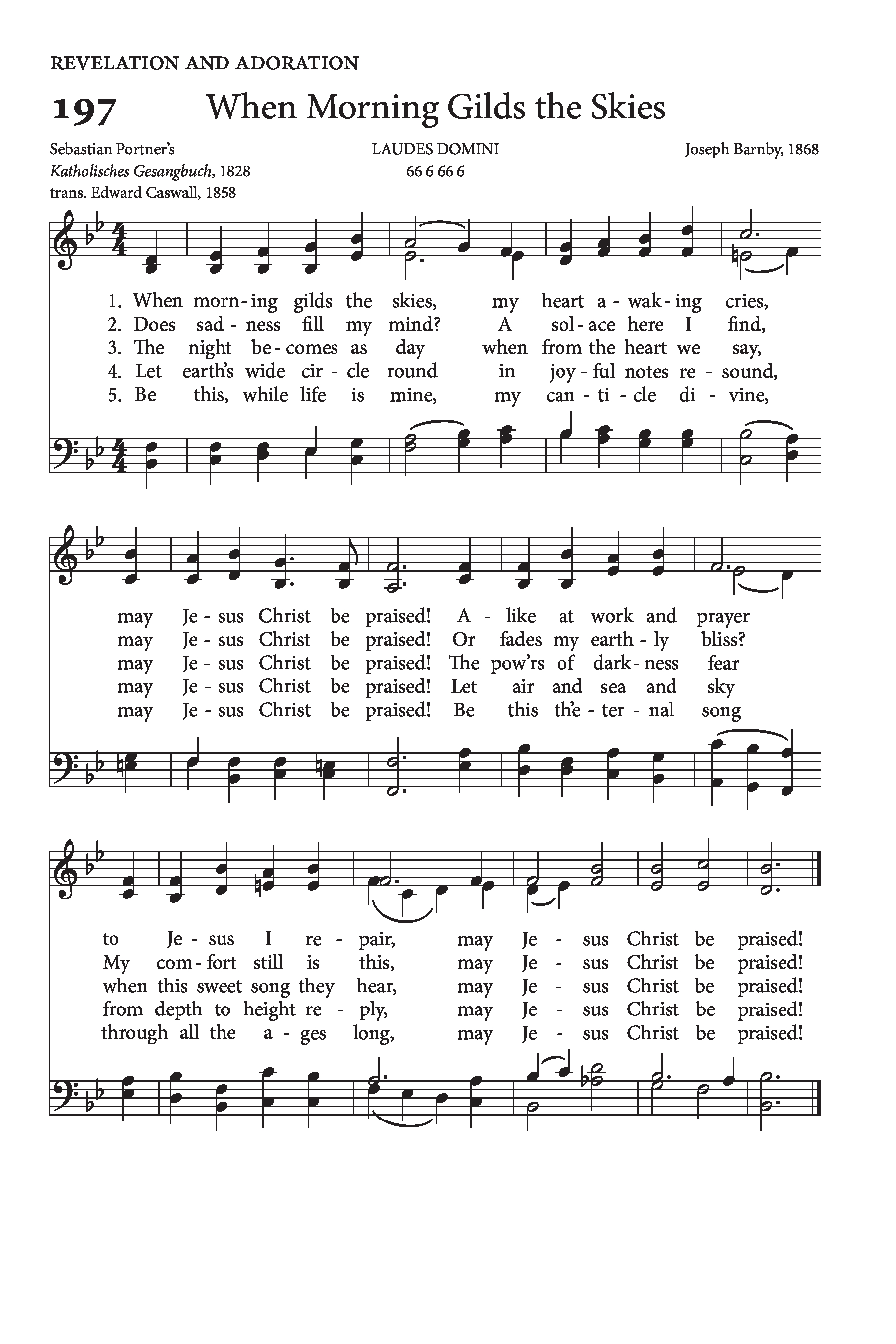When Morning Gilds the Skies
Lyrics
our hearts awaking cry:
May Jesus Christ be praised!
in all our work and prayer
we ask his loving care:
May Jesus Christ be praised!
the hosts of angels cry:
May Jesus Christ be praised!
Let mortals too upraise
their voice in hymns of praise:
May Jesus Christ be praised!
in joyful notes resound:
May Jesus Christ be praised!
Let air and sea and sky
from depth to height reply:
May Jesus Christ be praised!
of all our thoughts the last:
May Jesus Christ be praised!
The night becomes as day
when from the heart we say:
May Jesus Christ be praised!
to Christ, our loving King:
May Jesus Christ be praised!
Be this the eternal song
through all the ages long:
May Jesus Christ be praised!
Bible Reference
Exodus 15:2
About This Hymn
“When Morning Gilds the Skies” is a hymn of enduring praise, capturing the Christian’s call to glorify Christ from the rising of the sun to its setting. The hymn originated in early 19th-century Germany under the title “Beim frühen Morgenlicht,” which translates to “At early morning light.” First appearing in a Roman Catholic hymnal in Würzburg in 1828, the original author remains anonymous, though tradition often attributes it to a Benedictine monk. This attribution, while uncertain, aligns with the hymn’s themes, as the Benedictine tradition emphasizes structured prayer throughout the day, particularly the Liturgy of the Hours, which begins at dawn. The hymn’s spirit reflects a life dedicated to continuous praise, where even the smallest moments of the day are turned Godward.
The original German text consisted of about fourteen stanzas, each ending with the refrain “Gelobt sei Jesus Christ,” meaning “May Jesus Christ be praised.” These verses traced a spiritual journey that included not only the start of the day, but also times of work, struggle, silence, and even death. This sweeping vision of praise was not based on feelings or circumstances but rooted in the constancy of Christ’s presence. The original hymn was contemplative, flowing out of a deeply liturgical and devotional tradition, and its repeated refrain served as a simple yet profound affirmation of the believer’s union with Christ in all seasons of life.
The hymn made its way into the English-speaking world thanks to the work of Edward Caswall (1814–1878), an Anglican clergyman who later converted to Roman Catholicism and joined the Oratory of St. Philip Neri in Birmingham, England. Caswall had a keen gift for languages and sacred poetry, and his desire was to make the rich heritage of Latin and German hymns accessible to English-speaking congregations. In 1854, he translated “Beim frühen Morgenlicht” into English as “When Morning Gilds the Skies” and included it in his collection Lyra Catholica. Caswall’s translation preserved the heart of the original German text while crafting it in elegant Victorian English, suitable for congregational singing.
Caswall did not translate all the original stanzas, choosing instead to render about six into English, and his version ended each stanza with the refrain “May Jesus Christ be praised.” His poetic skill brought a musicality to the lines that made the hymn both reverent and lyrical. The hymn begins with a tranquil image—morning sunlight gilding the sky—immediately orienting the soul to worship. The next stanzas continue to follow the rhythm of a believer’s day: from waking, to speaking, to working, to suffering, to facing the end of life. In each of these moments, the refrain remains the same: May Jesus Christ be praised. This repetition gives the hymn a meditative quality, rooting every life experience in doxology.
Musically, the hymn found its most enduring setting in the tune “Laudes Domini,” composed by Sir Joseph Barnby in 1868. Barnby, a noted English composer and conductor, gave the hymn a stately and worshipful melody that matched the dignity of Caswall’s words. The name of the tune, Latin for “praises of the Lord,” underscores the hymn’s theme. The tune begins softly and rises gently, reflecting the progression from the quiet of dawn to the active praise of day. The musical phrasing naturally lifts the congregation’s voice upward, enhancing the spiritual atmosphere of the text. Though several other tunes have been used with the hymn, “Laudes Domini” remains the most widely recognized and beloved, especially in Anglican, Episcopal, and traditional Protestant circles.
The hymn’s impact has been long-lasting, and it has appeared in nearly every major hymnal published in the English-speaking world since the late 19th century. Its theological focus is clear and Christ-centered, emphasizing continual devotion regardless of time or circumstance. It does not demand a certain emotion or condition for worship; rather, it assumes that worship is the natural response of a soul who knows Christ. Whether one is alone in silence or among a throng of worshipers, whether rejoicing or suffering, the proper posture is one of praise. This theme resonates deeply with both liturgical traditions and evangelical spirituality, making it a bridge between different expressions of Christian worship.
Throughout the hymn, there is an implicit echo of biblical texts, especially those from the Psalms. Psalm 113:3 says, “From the rising of the sun unto the going down of the same the Lord’s name is to be praised.” This scriptural idea forms the foundation of the hymn’s first stanza and shapes the rest of its theology. Other lines suggest reflections from Philippians 1:21—“For to me to live is Christ, and to die is gain”—especially when the hymn asserts that even in death, “May Jesus Christ be praised.” The hymn also aligns with Paul’s exhortation in 1 Thessalonians 5:16–18: “Rejoice evermore. Pray without ceasing. In every thing give thanks.”
One reason for the hymn’s longevity is its adaptability across many settings. It is just as fitting for morning devotionals as it is for grand cathedral worship. It has been sung in quiet chapels at sunrise and at large gatherings of believers in times of national reflection. It has been featured in wedding services, where couples commit to a life of shared praise, and at funerals, where mourners commend a soul to eternal worship. In every context, the refrain is both reminder and declaration: Christ is to be praised, not because life is always good, but because Christ Himself is good.
The language of the hymn is also worth noting for its poetic excellence. Phrases like “When morning gilds the skies,” “The night becomes as day,” and “Be this the eternal song” carry a gentle rhythm and elegance that draw the soul upward. The word “gilds” itself evokes the image of golden light brushing the heavens—a metaphor that beautifully matches the inner awakening of the heart toward divine praise. Caswall’s use of elevated diction, coupled with accessibility, allows the hymn to be sung by both choirs and congregations without losing its depth.
Today, “When Morning Gilds the Skies” remains one of the most beloved hymns in traditional hymnals. It is often included in morning worship, Sunday liturgies, and special services throughout the year. Though it originated from a Roman Catholic source, it has been embraced by Protestant churches around the world, speaking to the universal nature of its message. Its enduring popularity lies in its simplicity and spiritual depth: it does not complicate the act of worship, but rather simplifies it into one beautiful refrain—“May Jesus Christ be praised.”
The hymn stands as a testimony to the power of translated hymnody to transcend borders and denominations, reminding believers that the core of Christian worship is not confined to time, place, or tradition. From its anonymous beginnings in a German monastery to its place in countless modern hymnals, “When Morning Gilds the Skies” continues to inspire believers to a life of praise, beginning at dawn and continuing forevermore.


📬 Subscribe to Our Devotional Updates
Receive weekly hymns, devotionals, and website features directly in your inbox.
Hymn Information

- Category: Hymn
- Author/Writer: Edward Caswall (1854)
- Added: June 26, 2025
- Last Updated: June 26, 2025
- Views: 1533
To view the author's biography, click their name above.
MIDI File
More Hymns by Edward Caswall
Popular Hymns
Recent Blog Posts
Popular Blog Posts
Visit Us on Social Media
Latest from X (Twitter)
Tweets by HymnalLibraryLatest from Facebook
Latest on YouTube
Daily Bible Verse
Disclaimer
The hymns, sheet music, MIDI files, and related content on this website are provided for educational and research purposes only.
- Public Domain: Many of the hymns featured here are in the public domain and may be freely used.
- Copyrighted Works: Some hymns may still be under copyright protection. Where applicable, permission has either been requested from the copyright owner, or the content is shared under the principles of fair use for educational purposes.
⚠️ Important Notice: If you wish to reproduce, distribute, or use any copyrighted hymn beyond personal study or educational use, you must obtain permission directly from the copyright holder. This website does not grant any rights for commercial use yet.
If there is any other question please address it to us in our Contact Page, for further assistance. Thank you for using the site. May God Bless You.













